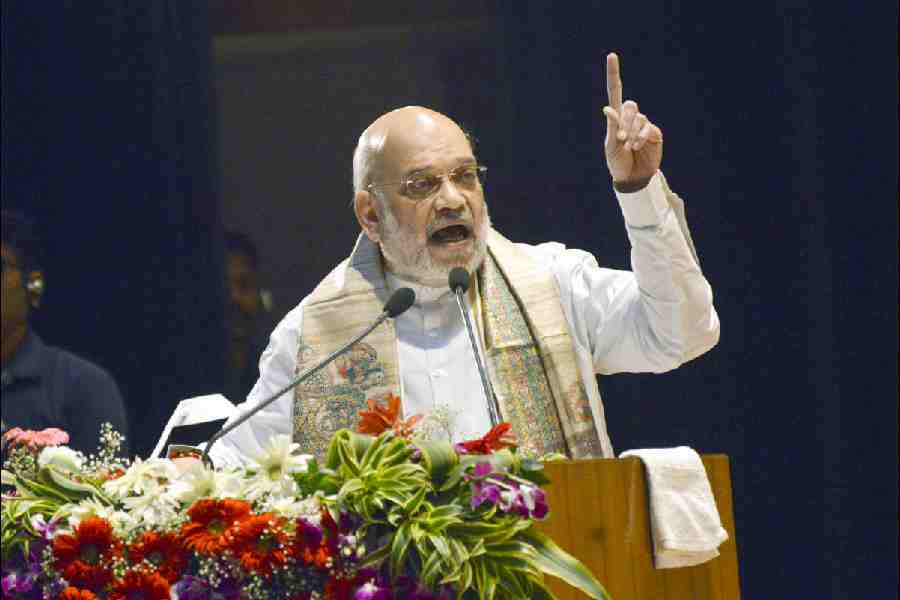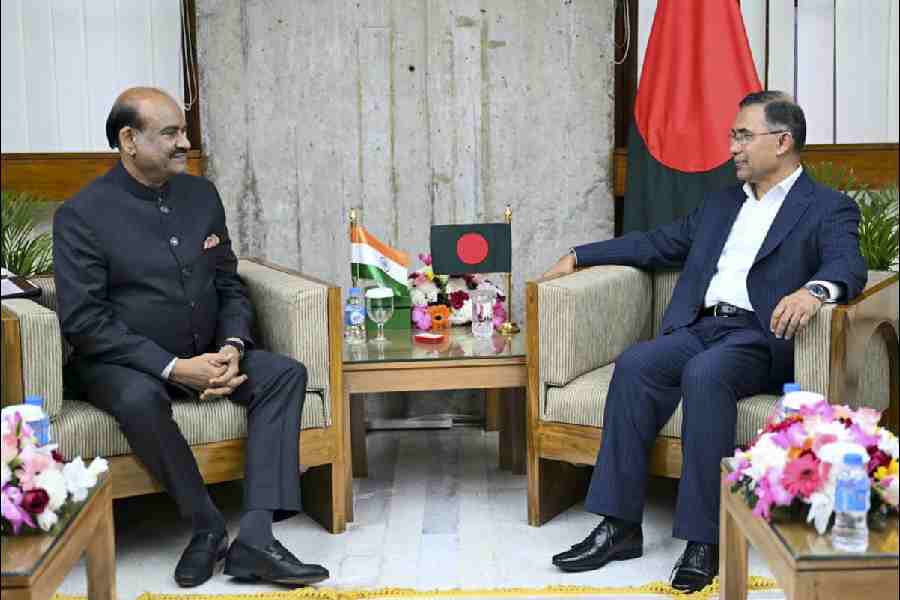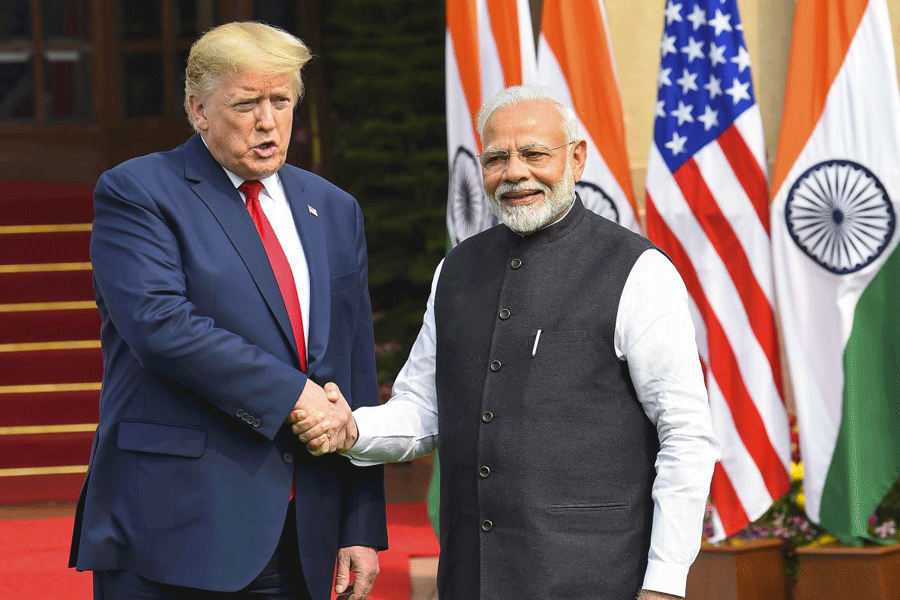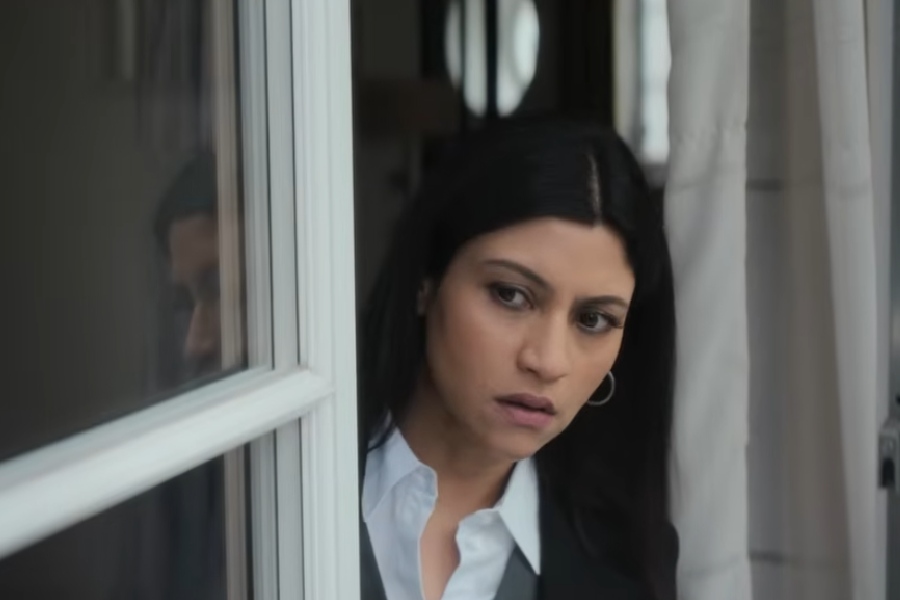.jpg)
The centenary of the October Revolution is a little over a month away. But the only symbol of Communism's most celebrated event in M.A. Baby's office is a single-page calendar with pictures of Lenin and Fidel Castro flapping against the wall. Sitting in his second-floor office at A.K. Gopalan Bhavan, the central headquarters of the Communist Party of India (Marxists) or CPI(M) in Delhi, the politburo member is in expansive mood. He doesn't go down the revolutionary memory lane; instead, he reads out a WhatsApp joke.
A group of men, goes the joke, accosts a man and asks him to sing Vande Mataram. The next thing you know, the accosters themselves are beating a hasty retreat. Why? Because the man asked them to sing and said he would follow. "They don't know anything beyond Vande Mataram," guffaws Baby.
That's the first chuckle I have heard this evening at the A.K.G. Bhavan. Outside, the atmosphere is rather somnolent; a far cry from a decade ago when the UPA-I was in power and what the CPI(M) said was considered more important than the views of the Centre. Those days, mediapersons would mill around this place, looking for a quote from any party functionary who was willing.
Baby, who was then the education minister of Kerala, was far away from it all. But he was closer to one phenomenon that lasts to this day - the cycle of violence between the cadres of the CPI(M) and the Rashtriya Swayamsevak Sangh (RSS).
The 63-year-old, of course, dubs the "so-called violence" between the CPI(M) and the RSS-BJP combine a "wrong presentation". But he is not unwilling to talk about the history of these hostilities. He traces it all back to the early Seventies and explains it in an unhurried fashion with his stock phrase, "to cut a long story short" thrown about liberally.
"I can cite many instances when the workers of the CPI(M) physically prevented the RSS from inciting riots. In 1970-71 in Tellicherry (in Kerala's Kannur district), an RSS mob was moving towards a minority settlement to set it on fire. But the comrades prevented that."
He talks about the Justice Joseph Vithayathil Commission that looked into the 1971 disturbances and how it recognised the contribution of the Left in controlling the riots.
Baby ascribes the increase in incidents of violence in recent years - there have been more than 60 political murders in the last 10 years - to the "frustration" of the RSS. "It uses violence as a means to further its goals. That has been the case ever since it was formed. Its leaders got their inspiration from Mussolini and Hitler and these facts are well documented." He cites M.S. Golwalkar, the RSS ideologue and Prime Minister Narendra Modi's ideological mentor, and his book Bunch of Thoughts.
Baby quotes extensively from Golwalkar's book from memory, about the "outlook of the RSS", and even rattles off page numbers from time to time.
But weren't several RSS workers killed allegedly by CPI(M) workers over the years? "The RSS workers may have been killed when the Left and secular-minded people tried to prevent riots," replies Baby. You point out that that is a tad too simplistic an explanation. After all, several cases of murder against CPI(M) workers are under investigation and many more are in courts at various stages. This time he leans in, taps the table with his hand and says, "I am not saying that no RSS worker has been killed by non-RSS people. But at the same time, it should be recognised that the politics of violence that the RSS pursues is the main problem."
Baby is also quick to point to "independent" studies that have stated that there have been more casualties on the Left and the CPI(M) side than the RSS. "The RSS workers, on the other hand, have been killed by their own people as in the case of the young student and RSS activist, Ananthu, a few months ago," he says.
The recent killings have been cited as the reason behind the heightened activity of senior BJP and RSS leaders in the state. Baby, however, says that it is all part of a larger plan. "The BJP has declared that they want a Congress- mukt Bharat. In fact, they want an Opposition-mukt Bharat. They are trying to expand to every corner and Kerala is an obvious choice. Here, they want to focus on the Left because we are the only force fighting them ideologically and politically."
But, according to him, Kerala may prove a difficult nut to crack for the BJP. "Kerala has a great secular tradition. Progressive secular ideology is very much ingrained in the mind of the state and most of the people. So it will be very difficult for the BJP to sell its political ideology of hatred in Kerala."
You cannot help but point out that this is something CPI(M) used to say about Bengal, but the BJP is arguably the second most popular party in the state today. Says Baby, "It was the TMC that brought the BJP into the state as an alliance partner when Mamata Banerjee was part of the NDA. It gave it some legitimacy. We never yielded any space to the BJP."
Reflecting on his own party's state in West Bengal, he says that the party has "apologised for its mistakes" and the faithful will return to the fold eventually.
So is he saying there is no danger whatsoever of losing the Kerala plot to RSS-BJP? Baby admits that there is no denying the "gravitational attraction" towards the ruling party. He says, "If one is not politically clear and ideologically committed, there is a danger of one getting attracted. An infatuation may develop towards power."
Baby, who went to jail for protesting the Emergency in 1975, sees parallels between that time and now. "We had foreseen Indira Gandhi's authoritarian streak long before others. We said so in the Ninth Congress of our party, in 1972 in Madurai. Modi could also fabricate a larger-than-life image and move towards authoritarianism. That project in fact is already on. Not allowing the Tripura CM's speech on Independence Day was Emergency-like."
Peddling the Kerala line of the party, which basically is for no open tie-up with the Congress, Baby says, "We follow political and tactical lines. The fight is now against communalism and the fascistic tendencies of the Sangh Parivar. This is the primary task. But at the same time, we have to also fight against the economic policies that have led to farmer suicides, posed a threat to the livelihood of the workers and contributed to growing unemployment. When it comes to exploitative economic policies, there is no difference between BJP and Congress."
When Opposition is trying to come together, isn't that a dogmatic way of looking at things? " Sui generis. We are one of a kind party. All political parties are accused of running after power. You cannot say that about our party even if you don't agree with many of our decisions," he says.
A two-time Rajya Sabha MP from Kerala, Baby was only 31 when he was fielded from the state by stalwarts like E.M.S. Namboodiripad, E.K. Nayanar and V.S. Achuthanandan. "They were wise leaders but they made one unwise decision," Baby jokes.
That he enjoyed his stint is evident from the number of stories that tumble out of him when he talks about his more-than-a-decade-long tenure in the Upper House. He recalls, in particular, several friendly and virulent repartees between Manmohan Singh, the then finance minister, and Communist leader Ashok Mitra. "Once Dr Singh came to our corner in the lobby and asked Ashok da about him and his wife. 'Don't exchange pleasantries with me when you are following pernicious economic policies,' Ashokda said. Dr Singh took it rather sportingly as he knew Ashok da for a long time. I was taken aback and tried to pacify."
Baby also forged long friendships, none closer than the one with the renowned author R.K. Narayan, who was a nominated member to the Rajya Sabha.
He was inspired by Narayan's concern about the burden of schoolbags and once he was appointed education minister of Kerala, in 2006, he changed the system. "By printing two sets of books for the first term and second term, the reduction in the weight of the school-bags was significant. I announced soon after the decision that it was our tribute to R.K Narayan."
These days, Baby spends most of his time in Delhi. His wife, Betty Louis, is a television executive in Thiruvananthapuram, and his son, Ashok Betty Nelson, is the lead guitarist and music composer of the Ernakulam-based band, Thaikkudam Bridge. His son's last name is a nod to Nelson Mandela. "I told Mandela about this when he was in India and he said that he was delighted."
The October Revolution may have evaporated from popular imagination, but Baby is one of those who still believe that it is Communism that will show the way forward. He claims that a "thousand rebellions" are taking place away from the media glare and points to anger among the landless, peasants, students, jobless youth and other sections of the society. He even sees "sporadic forces" developing across the country and quotes Mao Zedong - "A single spark can start a prairie fire."
But then, there are wet prairies too.
tetevitae
Baby's initiation into politics happens in his school days through the Kerala Students' Federation
Gets arrested during the Emergency. A college student then, the arrest cuts short his studies and he is unable to complete his undergraduate programme in Political Science
1986: Becomes Rajya Sabha member at 31
Later, as education minister in the V.S. Achuthanandan government (2006-11), brings about several reforms in the education sector: single window admission system for higher secondary education, grading system in high schools, and so on
2012: Becomes the first Christian Politburo member

.jpg)









